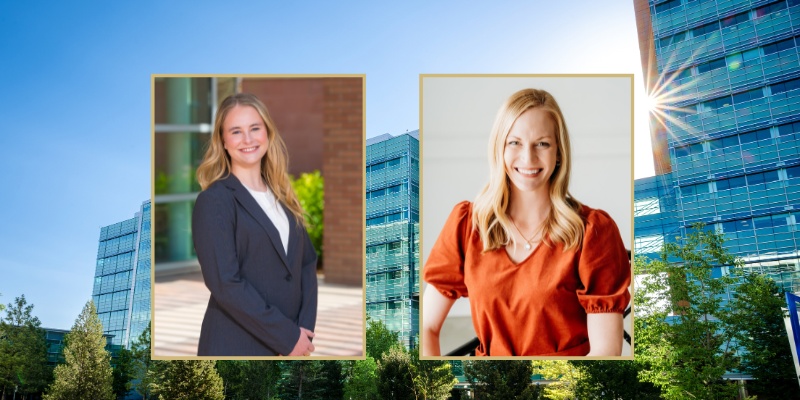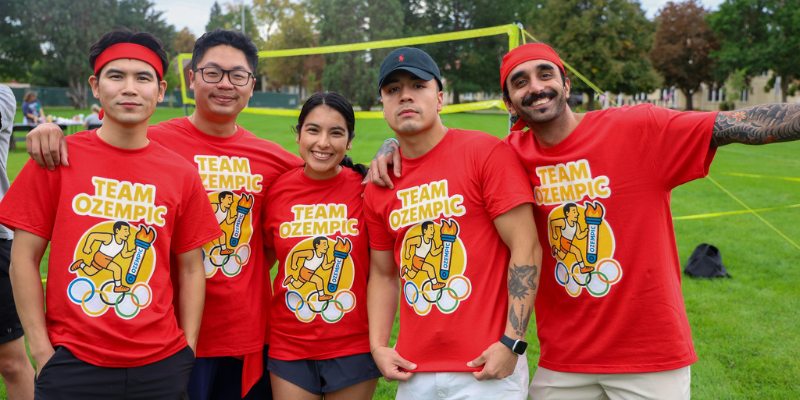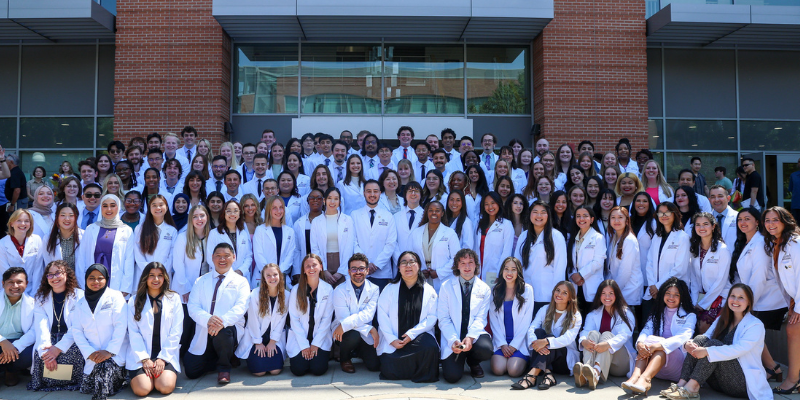In his ninth installment, P-4 Ahsun Babalmorad interviews fellow fourth-year student Adam McHenry about compounding and research he is working on.
Ahsun Babalmorad (AB): Alright, welcome back to Talk Pharmacy. Just two more rotations left before I graduate. It’s very exciting. Something else that’s very exciting is that I had a chance to go to midyear which was held in Las Vegas. For those of you who don’t know what Midyear is, it’s the biggest pharmacy event of the year where all the residency programs get together in one place and do the best they can to intimidate you! No, they essentially have a showcase where you get the opportunity to walk around and talk to residency directors and chance to see what kind of programs are out there. If you are considering a residency that’s something you might want to look into. It was a very interesting experience. There’s nothing like being in a room with thousands of nervous pharmacy students.
A lot of tension… tension in the air. If I was going to compare it to anything – being at a funeral had the same type of vibe. But if you’re considering a residency it’s something to look into.
On this episode I talk to Adam McHenry he is a fourth year pharmacy school student. We talk about the CPCC national compounding competition and we talk about some of the research he is doing here on campus.
He’s a great guy. Really enjoyed talking to him. Take a listen.
Welcome back to Talk Pharmacy. I’m here with my guest Adam McHenry.
Appreciate you taking the time to be here today.
Adam McHenry (AM): Thank you for having me. I know we’ve been trying to figure out how to get this thing started.
AB: We both have busy schedules, but we’re on rotations now. We’re in the home stretch.
Are you planning on doing a residency when you graduate?
AM: My interest and focus throughout my didactic work has been on compounding. I’d like to stay in compounding.
AB: Speaking of compounding, I know you guys came up second place in the SPCC – the student pharmacist compounding competition. It’s a national competition, right?
AM: Right. It’s a national competition that Medisca puts on. Medicsca is a compounding supplier. And hey also involved in health care education. So they put the SPCC on. This is the sixth year. The last three years CU has been involved. We placed first three years ago. Second last year and second this year as well. CU has been very successful in representing our school nationally on compounding.
AB: Right. So I imagine it might be somewhat difficult to organize a competition around compounding. How do they have this competition structured or how do they have you guys compete?
AM: How they have it structured is Medisca sends out compounding packages to all the schools involved throughout the nation and all those schools hold local, national competitions. So there will be multiple teams competing for a place in nationals. And the winners of the regional competitions go to nationals. And typically there’s about 20 compounding schools with 20 compounding teams represented. Each team has three pharmacy students.
AB: From what I understand, they break the competition up into three components?
AM: Yeah, it’s a two day competitions and there’s three diff components. The firs is a compounding component and that’s worth the most amount of points. Cu has always done very well in the compounding portion. It’s almost a free for all. They give us a doctor’s prescription with a bunch of chemicals and we have to figure out how to make these compounds and we’re not allowed to use any electronic databases at all and we have to develop our own formulas, do our own calculations, our own methods and procedures. We have to abide by all the current regulations, USP 797, 795. And we have to …I would we spent 70—80% of our time just on the paperwork portion rather than using the mortar and pestle actually making the medication. It’s pretty intense.
AB: Where’s the main competition held?
AM: So, the last two years it was held in Florida at the University of Florida. They have very nice compounding facilities. This year it was held at USC in California.
AB: Can anyone participate in this competition or do you have to meet certain qualifications?
AM: Anybody that’s interested in compounding, anyone who has compounding experience or know compounding experience can get a team of three students and compete in the regional competition. So it’s open to every student.
AB: That’s great. I wanted to have you on so we could talk about compounding because I know you’re very knowledgeable on the subject. And nowadays everybody seems to be focusing on clinical pharmacy and compounding I feel has been pushed aside. Why do you think there’s this transition from compounding being a defining role of a pharmacist to being more of a specialty?
AM: I think historically, especially before the 1950s, when manufacturing took off, basically all medications were compounded. Then it went into more of a manufacturing role. And there are several benefits to manufacturing. One is a consistent product. And through the evolution of pharmacy and the way we have changed our profession now to the PharmD role, it’s very clinical. And I think there’s less emphasis on compounding. But it’s definitely making a resurgence. And now the new accreditation guidelines from ACPE for pharmacy schools lists compounding as a key element in the new 2016 standards.
AB: And with manufacturing can produce medications on a larger scale and as you said they can put out more of a consistent product. With that said, why would you say that compounding is still an important skill to have?
AM: Every year you can look at the drug shortage list and there’s at least 200 new drugs in the ASHP website that for whatever reason are not available because something happened in the manufacturing process, because the manufacturer isn’t making them any more, so we’re talking 200 meds that patients cannot use and there’s no way they can get it and the only way they’re going to be able to get their medication is through a compounder. And this list never gets smaller. It’s consistently around 200 if not more since 2011
AB: Other than shortages are there other major advantages to compounding pharmacies?
AM: Compounding is all about personalized medication. When a drug is manufactured it’s based off a 160 pound male. Well, not everyone is a 160 pound male. Compounding is all about personalization. So we can change dose and strength of all medications. We can increase patient adherence by making the medication more palatable. We can flavor it. We can reformulate medication. Let’s say a patient is allergic to dyes or gluten. So they can’t take the commercially available medication. Well, we can take out the irritants and whatever is causing the allergy and dispense that to the patient.
AB: So, let’s talk about NCPA, that’s the national community pharmacists association, which you are the president of. Does this organization only represent pharmacists that work at independent pharmacies or do they represent all community pharmacists?
AM: NCPA just represents independent pharmacies, specifically. With that being said there are some independent pharmacies that have chains, multiple locations such as Good Day Pharmacy here in Colorado. I think they have maybe a dozen independent stores. But it’s not your CVS, your Walmart, your Target. They represent just independents.
AB: What would you say is the biggest difference between independent pharmacies and the big retail chain pharmacies?
AM: I believe the biggest difference between chain and an independent pharmacy is the amount of time the pharmacist gets to spend with the patients. From what I have observed and the time that I have spent working in independent pharmacy. I’ve seen pharmacists dedicate a lot more time to patient relationships and managing patients a lot more than the big box stores, as I like to call them. Because they are really focused on numbers and statistics. Trying to get a certain script count. Where independents it’s kind of like that old timey feel where you know your pharmacist. They know what medications you’re on. You have this well established relationship where you can help your patient out.
AB: Isnt’ that because they’re not as busy?
AM: You would be surprised. There’s a B & B pharmacy where they were doing 400 scrips a day. That’s a small independent retail pharmacy … middle of nowhere Colorado. And they know every single patient by name that comes through their doors. So, I think it’s a different type of mentality. I think the owners of independent pharmacies have a vested interest in their patients and they need to keep their patients. Where the big box stores… a lot of the pharmacists show up they are trying to get that script count. Where independent pharmacies they want that relationship and that relationship is what will bring the patient back. When we focus just on numbers it devalues our services. We’re very good at what we do. We are the drug experts. We need to pursue that. One way to pursue that is to spend time with patients not just looking at numbers. But unfortunately the way our profession has evolved and it’s been going we only get paid for what we dispense. So, it’s understandable why these box stores want to have these high numbers.
AB: And a lot of patients just want to get in and get out. So that makes it difficulty as well.
AM: That is a problem. Educating the public is something we need to work on as a profession. I don’t know if most of the public, even my close family knows exactly what a pharmacist does and what our education entails and know a pharmacy is not a McDonalds. Something where you order and you just pick up right away. There’s a lot that goes into it.
AB: Yeah, definitely. We will have to leave it there. We’re out of time. I appreciate you taking the time to talk to me about compounding and why you think it’s important.
AM: Definitely, Ahsun. Thank you for giving me the opportunity to shed some light on compounding. I know I get a lot of questions on compounding. Hopefully this is helpful.
AB: You’ve published a couple papers, right?
AM: Yes. So, Dr. Rice and I have been working on a couple of stability studies for a couple oral suspensions and we’ve published two research papers. One on hydroxychloroquin and clonazepam. And our current research for compounding we’re testing transdermal formulations right now and we’re looking to publish a paper on that as well.
AB: You guys are using pig ears?
AM: It sounds odd, but the porcine ear model is the best model that we have to duplicate human skin. A lot of these transdermal studies have used cadaver skin. Typically that’s lower trunk skin and the patient has bene deceased for a while. And it really doesn’t provide a good model. But when we go and get the pig ears we use them the same day. So it’s fresh skin. It’s very similar to human skin and it provides a very good model.
AB: And you’re using that now for the research you are currently working on?
AM: Yes, we are using that now to test different formulations with different active pharmaceutical ingredients and their transdermal ability through the skin.
AB: Good luck on your research and good luck on your rotations. Thanks for listening to Talk Pharmacy. Take Care.



